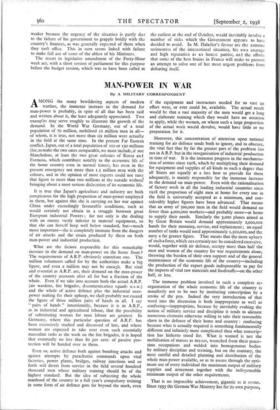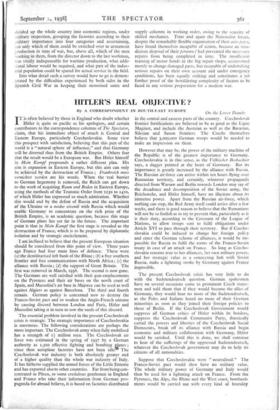MAN-POWER IN WAR
By A MILITARY CORRESPONDENT
AMONG the many bewildering aspects of modem warfare, the immense increase in the demand for man-power is probably, in spite of all that has been said and written about it, the least adequately appreciated. Two examples may serve roughly to illustrate the growth of the demand. In the World War Germany, out of a total population of 7o million, mobilised 12 million men in all— of whom, it is true, not more than six million were actually in the field at' the same time. In the present Far Eastern conflict, Japan, out of a total population of too or 130 millions (for, to make the two cases comparable, we must include, if not Manchukuo, at least the two great colonies of Korea ani Formosa, which contribute notably to the economic life of the home country even in normal times), has even in the present emergency not more than t 5 million men with the colours, and in the opinion of most experts could not raise that figure to more than two millions at the outside without bringing about a most serious dislomtion of its economic life.
It is true that Japan's agriculture and industry are both conspicuous for the high proportion of man-power employed in them, but against this she is carrying on her war against China under exceedingly favourable conditions, such as would certainly not obtain in a struggle between great European industrial Powers ; for not only is she dealing with an enemy vastly inferior in material equipment, so that she can herself keep well below standard, but—much more important—she is completely immune from the dangers of air attacks and the strain produced by them on both man-power and industrial production.
What are the factors responsible for this remarkable increase in the demand on man-power on the home front ? The requirements of A.R.P. obviously constitute one. The million volunteers called for by the authorities make a big 'figure, and even a million may not be enough. But vital and essential as A.R.P. are, their demand on the man-power of the country accounts after all for but a fraction of the whole. Even if we take into account both the actual A.R.P. (air wardens, fire brigades, decontamination squads u.s.w.) and the whole of active defence plus the industrial man- power making for their upkeep, we shall probably not exceed the figure of three million pairs of hands in all. I say " pairs of hands " intentionally, because it is in A.R.P., as in industrial and agricultural labour, that the possibility of substituting woman for man labour are greatest. In Germany, where this particular question of A.R.P. has been extensively studied and discussed of late, and where women are expected to take over even such essentially masculine tasks as the work on the fire brigades, it is hoped that eventually no less than 8o per cent. of passive pro- tection will be handed over to them.
Even so, active defence both against bombing attacks and against attempts by parachutist commands upon vital factories, power plants, bridges, railway junctions and so forth will divert from service in the field several hundred thousand men whose military training should be of the highest standard. But the idea of subjecting the whole manhood of the country to a full year's compulsory training in some form of air defence goes far beyond the mark, even if the equipment and instructors needed for so vast an effort were, or ever could be, available. The actual result would be that a vast majority of the men would get a long and elaborate training which they would have no occasion to apply, while the women, on whom such a large proportion of the actual work would devolve, would have little or no preparation for it.
Moreover, this concentration of attention upon national training for air defence tends both to ignore, and to obscure, the vital fact that by far the greater part of the problem lies not in A.R.P. but in the reorganisation of industrial production in time of war. It is the immense progress in the mechanisa- tion of armies since 1918, which by multiplying their demand for equipment and supplies of all kinds to such a degree that all States are equally at a loss how to provide for them adequately, is mainly responsible for the immense increase in the demand on man-power. Even with the rationalisation of factory work in all the leading industrial countries since 1918 the proportion of eight men at home for every one in the field is universally accepted as a minimum, and con- siderably higher figures have been advanced. That means that an army of 500,000 men in the field would demand no fewer than 4,000,000 workers—and probably more—at home to supply their needs. Similarly the 3,000 planes aimed at by Great Britain would demand approximately 2,000,003 hands for their manning, service, and replacement; an equal number of tanks would need approximately 1,503,000, and the navy a far greater figure. That means that the mere upkee? of such a force, which can certainly not be considered excessive, would, together with air defence, occupy more than half the men and women of the country for war requirements alone, throwing the burden of their own support and of the general maintenance of the economic life of the country—including the production of the export goods indispensable to pay for the imports of vital raw materials and foodstuffs—on the other half, or less.
The immense problem involved in such a complete re- organisation of the whole economic life of the country is manifestly not to be met by instituting conscription by a stroke of the pen. Indeed the very introduction of that word into the discussion is both inappropriate as well as confusing—inappropriate, because by inevitably evoking the notion of military service and discipline it tends to alienate numerous elements otherwise willing to take their reasonable share in the defence of their home and country : confusing because what is actually required is something fundamentally different and infinitely more complicated than what conscrip- tion has hitherto stood for. What is wanted is not the mobilisation of masses as masses, wrenched from their peace- time occupations and welded into homogeneous bodies by military discipline and training, but on the contrary, the most careful and detailed planning and distribution of the whole man-power available, so as to assure through the opti- mum use of every individual the maximum output of military supplies and armament together with the indispensable minimum output of the other requirements.
That is no impossible achievement, gigantic as it seems. Since 1935 the German War Ministry has for its own purpose, divided up the whole country into economic regions, under military inspection, grouping the factories according to their military importance into four categories and ascertaining, not only which of them could be switched over to armament prOduction in time of war, but, above all, which of the men working in them, fiora the director down to the list workman, was .vitally indispensable for wartime production, what addi- tional labour would be required, and what part of the indus- trial population could be spared for actual service in the field.
Into what detail such a survey would have to go is demon- strated by the difficulties experienced by both sides in the Spanish Civil War in keeping their motorised units and supply columns in working order, owing to the scarcity of skilled mechaniCs. Time and again the Nationalist forces, despite the remarkably flexible organisation of their auto parts, haVe found themselves incapable of action, because an inju- dicious disposal of their personnel had prevented the necessary repairs from being completed in time. The insufficient training of motor hands in the big repair shops, accustomed merely to change damaged parts, but incapable of undertaking serious repairs on their own account and under emergency conditions, has been equally striking and constitutes a yet further proof of the bewildering complexity of factors to be faced in any serious preparation for a modern war.







































 Previous page
Previous page